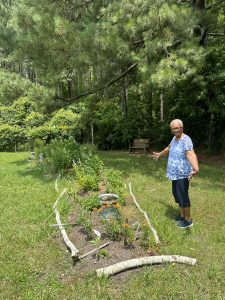
Board member Barbara Purnell shows off the pollinator garden, planted by the Lower Shore Land Trust at the Germantown School. The school is recreating the gardens and orchard that once graced the property.
By Cindy Hoffman, Staff Writer
(June 29, 2023) Barbara Parnell remembers butterflies in the fall. The entire area was filled with butterflies, she recalled from her student days at Germantown School in the 1950s.
The two-room school house on Trappe Road was built in 1923 by the Rosenwald Foundation Rural School Building Program as part of a public/private partnership made possible by Booker T. Washington and Julius Rosenwald (part-owner of Sears Roebuck). It was one of 11 “colored schools’’ built in Worcester County and 5,000 across the south.
Back when students walked through those doors, the two acres of land the school sat on had an orchard and a garden with medicinal and edible plants. The school is now bringing these memories back to life.
It is happening one plant and one grant at a time.
Last year, the Lower Shore Land Trust planted a migration garden in the back corner of the property to attract the butterflies and other pollinators that Parnell remembered so fondly.
“We hope to create a place for all people,” said Karen Prengaman, a board member with the Germantown School.
The longer term vision is to create a walkable garden that mimics what the student’s experienced when they went to school. They have planted apple and peach trees. Sassafras and mulberry trees were already growing on the property.
The gardens will be filled with native plants that the students remember were foraged and used for food and medicinals, including onions, which were used for headaches and infections, and wild horseradish.
Other plants such as thyme, rosemary and lamb’s ear, which was used for bandages and to stop bleeding, were brought over from Europe. Because many of the students remember their parents using these plants, they will also be included in the garden.
Prengaman has interviewed many of the former students to tap their memories. Most are 80 plus years old. “We must preserve history before this generation is gone.”
“This is not my story to tell, it’s their story,” said Prengaman. She went to Salisbury University for her masters in English and got engaged with the school when she was doing a project on African American Schools.
Prengaman says Germantown was an under-resourced school. “Theirs is a bootstraps story.”
The history of this community is one of doing with what you have, Prengaman said. “They focused on building the life that they wanted.”
Back when Germantown School was built, many African American schools were connected with a local church and Germantown was no exception. New Bethel United Methodist Church, just down the street, was established in 1855, and is the oldest African American church in the county and part of the Germantown School community.
“Bringing back the Germantown School is part of bringing the culture back and the role the school played in the community,” Prengaman said.
The school provided education for children in grades one through seven until 1962. Years later, the board of education sold the building to the County Highway Association and it was reconfigured into a garage.
The building was returned to the community in 2002. Through more grants the building was restored to its original design. Much of the building had to be replaced, including the floors and the entire front, which had been replaced with garage doors. It is now a replica of what the students remember.
Once restored, many of the former students brought items back that were original to the school, including the old school desks, one of the two stoves that kept the school warm in the winters, and books.
They have even received a hectograph. While not the original one used at the school, the school had one, which used stamp pads and ink to create worksheets and other materials for the students. Hectographs were the predecessor to the mimeograph.
Much of the effort to return the Germantown School to its original state is possible due to the work of people like Parnell and Prengaman, and grants.
In 2022, the Maryland Historical Trust selected the Germantown School Community Heritage Center to receive a matching trust grant. The project, Worcester County Voices: Early 20th Century African American Education, will provide school visitors with 20 indoor and outdoor stations exploring the educational experiences of the students through their own voices.
The indoor exhibits are being developed and will include the history of the school and other rotating exhibits.
A matching grant from the Maryland Coastal Bays Program will help pay for the healing gardens that will host medicinal plants, a coloring book, and interpretive signs related to pollination and plant identifiers. The funding is part of an effort by the Environmental Protection Agency to invest in the health, equity, and resilience of American communities.
The school is already back to playing a central role in the community. It hosts lecture series, field trips and fun days for schools, music and other community events.
The efforts at the Germantown School are all possible thanks to volunteers and donations. To learn more visit https://thegermantownschool.org/
